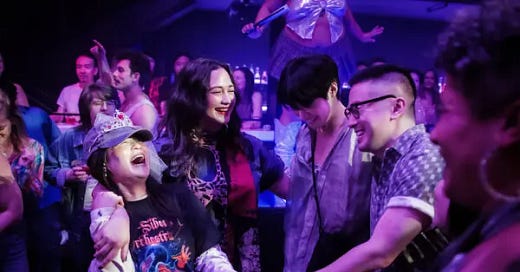Back in the halcyon days of the COVID lockdown, I was one of the “lucky” essential workers who kept going into work. I was thankful to still be receiving a paycheck, of course, but those early months were a little terrifying in wondering if you’d bring the virus home simply by going outside. I, like many Film Guys, hate watching movies on a phone or tablet, but with nothing to clean at work for months on end, I found a reprieve from the dread in cinema. To be quite clear, most of what I watched was garbage — a ton of DTV horror and action, which, if you know me, is my bread-and-butter — but a few gems snuck through. I’ve written at length about Sophy Romvari’s Still Processing and what that meant to me, but another true source of warmth was Andrew Ahn’s Driveways.
That film, wherein a young boy (Lucas Jaye) and his mother (Hong Chau) find friendship with an elderly war veteran (an astonishing Brian Dennehy in his final performance), struck me most because of Ahn’s patience and restraint. In only his second film, he bypasses every chance for there to be an overwrought, belaboured speech in favor of powerful silences. I think the idea that cinema should strictly be “show, don’t tell” is a bit overused, but there’s something to be said about being allowed to hold the emotion with someone rather than be told what to feel. Ahn finds every space available within his frames to exist and breathe with his characters.
After Driveways, I knew I was going to be a fan of Ahn’s for life. I went back and watched his debut, Spa Night, a gorgeous and vital coming-of-age tale about a gay Korean man finding himself at night in queer spas around LA. Again, those silences were overwhelming, especially held against those cool blues of steamy bathhouses. Even Ahn’s third feature, the more traditional romcom Fire Island, has these powerful moments of quiet that make the laughs of the film just a touch more cathartic.
There’s a complex honesty to Ahn’s films, something that makes them unforgettable in a sea of anonymous indie filmmaking. It’s why when he was announced to remake The Wedding Banquet, one of my favorite Ang Lee films, I found myself more hopeful than skeptical. Surely, if anyone could mine new life out of a genuinely ahead-of-its-time queer love story, it would be him. Faith was rewarded as his update of the story (alongside the original’s co-writer James Schamus) is as urgent and lovely as ever, full of delightful laughs.
Helped by an astonishing cast made up of Kelly Marie Tran, Lily Gladstone, Bowen Yang, Han Gi-chan, Joan Chen, and Youn Yuh-jung (even better here than her Oscar-winning turn in Minari), what makes his retelling truly sing is his now-trademark patience. Here, perhaps more than in any of his previous work, every moment of pain, sadness, hope, or love is expressed through minimal dialogue. In a few key moments, he goes a step further and cuts all dialogue, letting his camera linger on his stars’ faces. Realizations are felt, never said. His trust in his cast and audience, so rare in what could be described as a big box comedy.
I adored The Wedding Banquet and, as I often say before an interview, had to go to the source. In doing so, I had an illuminating and lovely conversation with Andrew. So generous with his time and answers, we had a long and winding talk about his new film, his search for found family throughout his work, conversations he has with his cinematographers and so, so much more. It’s one of my favorite talks I’ve ever had with one of my favorite working filmmakers, no less.
You can watch my conversation with Andrew in full below:




